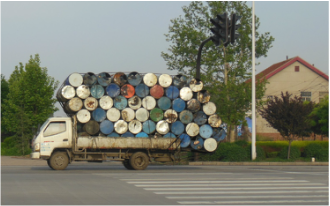 China's economy heading for a spill?
China's economy heading for a spill? I have all kinds of resolutions for blog posts in the summer months -- pictures! trenchant commentary! unsolicited opinions! jokes! reflections on teaching! insider scoops! but for now, please excuse me while I finish the last of the oral exams, mark the last tests, enter the last scores in the spreadsheet, and pack up another semester...

One thing Ross and I do know about is the boom and bust of construction cycles. He's worked in construction all his adult life, so we have lived through lots of booms and busts and we know how government policy has a direct influence on whether you hear hammers ringing at a construction site or not. We learned in fact that the political party that my husband's union sent his dues to, the New Democratic Party, chased Capital out of the province every time we elected them and presto -- no more construction jobs. After this happened twice we decided, gee, maybe we won't support the party that made us, personally, poorer because it couldn't learn this simple lesson -- the people who risk their money to build companies and develop properties will just move their money elsewhere when socialists try to take it.
The housing busts that follow housing bubbles are pretty painful, too. The well-meaning efforts, by Republicans and Democrats, to stimulate more home ownership in the United States led to world-wide catastrophe. Food for thought about whether putting your all-knowing hand on the levers of the economy to help this group or that group is a great idea, no? What was it Adam Smith said? Oh, yes: The statesman who should attempt to direct private people in what manner they ought to employ their capitals would not only load himself with a most unnecessary attention, but assume an authority which could safely be trusted, not only to no single person, but to no council or senate whatever, and which would nowhere be so dangerous as in the hands of a man who had folly and presumption enough to fancy himself fit to exercise it.

Government policy also fuels the amazing building boom across China -- municipal governments have used the Chinese version of eminent domain to take land from villages, clear away the goats and chickens, and contract with private companies to build business centers and apartment complexes. And in this process a lot of people have gotten very rich.

With millions of people leaving the farm and moving to the cities looking for jobs, the government focuses on keeping unemployment rates low. Thus, building projects offer lots of jobs for unskilled construction labor. (I mean no slur to skilled carpenters and tradesmen, which China could use a lot more of).
It's very important to the government to keep people employed to stave off unrest. But instead of food banks or welfare handouts, Chinese officials build for the future in the way that our municipal governments don't. Near our college, workers are landscaping huge elaborate linear parks for apartment dwellers who don't yet exist.
In contrast, in my home town, the city approves a subdivision in the hills such as Crawford Heights. The residents of Crawford Heights have to get into their car to get to any amenity and drive down an unimproved two lane country road to get into town. They were promised an elementary school -- hasn't happened. In Shandong Province, the road would have been built first, along with the landscaped parks and the schools and the shopping center.
As nice as that is, from my North American perspective, these Chinese levels of activity and the size of the public workforce look financially unsustainable. For example, as I've mentioned, there are public plantings of trees and shrubs and flowers on a massive scale, which will require care for the foreseeable future, especially since the Chinese plant everything so densely. That's a lot of labor to prune, water and haul fallen leaves away for decades to come.
Even though the Chinese officials don't have to curry the votes of their citizens, they still have to keep them happy. So say the experts. They say that the Chinese people are used to galloping growth rates -- the rapid increase in material well-being is the only thing that's kept the party from facing another Tiananmen-style uprising, so a slowdown, any cutbacks in public works, and rising unemployment will be a tremendous threat to the regime. We'll see.
If you're interested, this short article is useful for explaining China's current economic situation and problems in terms that even I can understand.
 RSS Feed
RSS Feed